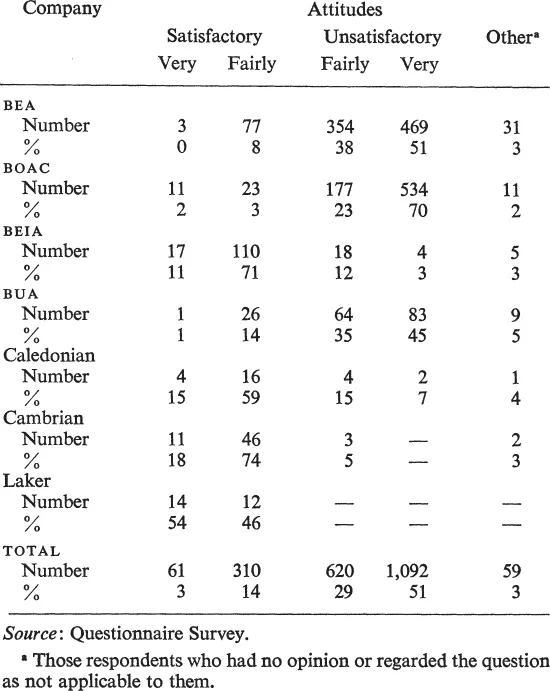The Survey Findings
This study has endeavoured to look deeper into the nature of the problem of pilot–management relations by investigating the attitudes of the parties to industrial relations. Questionnaire surveys of both pilots and management were conducted during the course of research and these provide the main source of the attitude data (see Appendices A and B for information relating to the questionnaire project). The survey of pilots covered approximately three-quarters of the total number of pilots employed in United Kingdom airlines in 1968, and the total response was 83 per cent. The companies included in the survey were as follows: BEA, BOAC, British Eagle, BUA and other Air Holdings subsidiaries, Caledonian Airways, Cambrian Airways and Laker Airways. The management survey included management pilots in all of these firms except the Air Holdings companies, and the response rate was slightly lower at 74 per cent.
The survey sought to investigate two main aspects of the problem: the extent to which pilots were dissatisfied with relations with management in their company, and whether pilots were especially critical of management’s understanding of industrial relations matters. The objective was to obtain some approximate measure of the strength of pilots’ attitudes to industrial relations subjects. It should be emphasized, however, that the survey of pilots was conducted during the interval between the first and second strikes in BOAC, and immediately following a strike by BUA pilots. Although it provides a unique account of pilots’ attitudes at a crucial stage in the development of the conflict, the attitudinal climate was more extreme than at some occasions in the past few years.
It can be seen from Table 1 that the great majority of pilots in the survey regarded pilot–management relations in their company as being disappointing. As many as 51 per cent of all pilots felt that relations were extremely unsatisfactory, while a further 29 per cent thought them to be fairly unsatisfactory. Very significant variations were found between individual companies. Whereas pilots in BOAC, BEA and BUA were particularly dissatisfied, a very high proportion in Cambrian Airways, British Eagle and Caledonian Airways were satisfied. Indeed, in Laker Airways not a single pilot considered that industrial relations were unsatisfactory. This questionnaire result contrasts sharply with the finding that pilot–management relations were thought to be inadequate by such overwhelming majorities as 93 per cent in BOAC, 89 per cent in BEA and 80 per cent in BUA. It is also highly significant that as many as 70 per cent of BOAC pilots indicated that industrial relations were extremely unsatisfactory.
The following questionnaire comments are typical of those made by senior pilots in the two air corporations:
‘Industrial relations between pilots and management is a disease I and my contemporaries have suffered from for years. It is relative to the bickering the U.S.A. will have with Hanoi or have had with North Korea.’
‘Many pilots, like myself, have watched with dismay the progressive worsening of relations between management and pilots, and would like to see something done to restore an atmosphere of mutual respect … a prerequisite of this is an appreciation by the management that employees of the standard of intelligence they require as pilots cannot be bullied and regimented.’
‘A concise summary of the severe disappointment I feel… is that having given years of loyalty, enthusiasm and competence to my company, its management have not the initiative or gratitude to reward that effort, most especially in recent years when a large profit has resulted from our efforts.’8
Table 1. Pilots’ Attitudes to Industrial Relations in their Company
These remarks serve to illustrate the widespread disillusionment with management.
The research findings on attitudes to industrial relations are supported by the questionnaire data on the pilots’ assessment of the general level of pilot morale in their company (see Table 2). As many as 65 pe...

